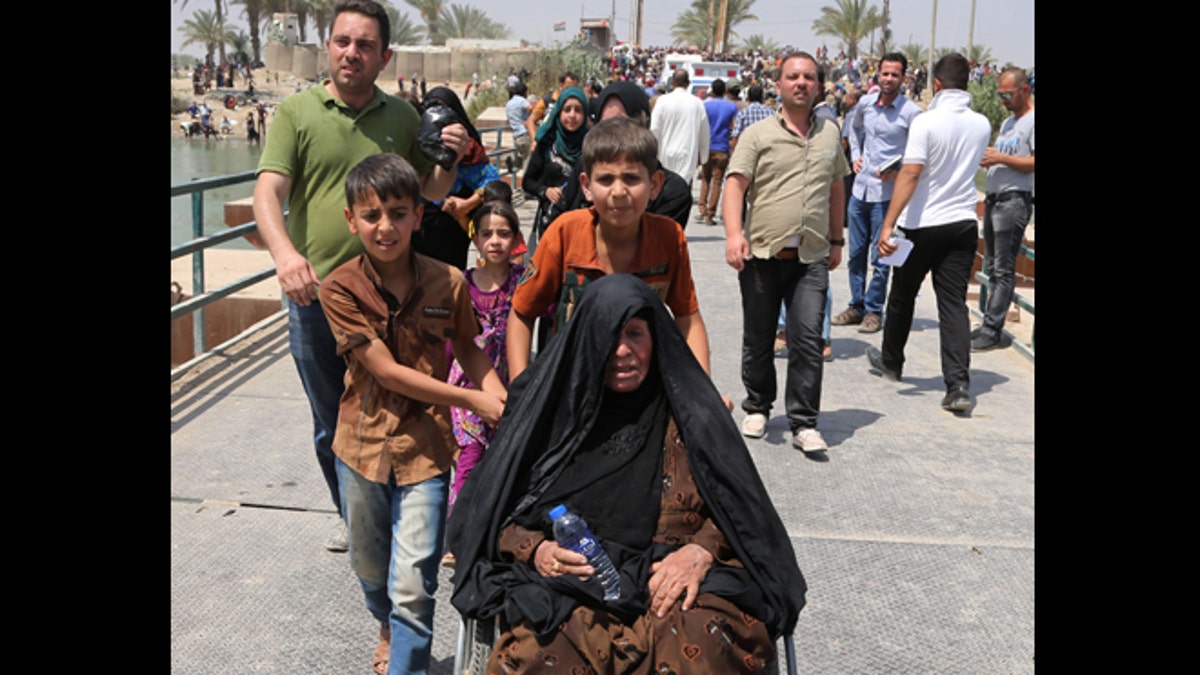
May 20, 2015: Thousands of displaced people fleeing violence in Ramadi poured into Baghdad province on Wednesday after central government granted them conditional entry, said a provincial official. (AP)
Thousands of displaced Iraqis fleeing the Islamic State takeover of Ramadi and the violence in the country’s western Anbar province poured into Baghdad on Wednesday after the central government waived restrictions and granted them conditional entry, a provincial official said.
The exodus is the latest in the aftermath of the fall of the city of Ramadi -- the capital of Anbar, Iraq's largest Sunni province -- to the Islamic State over the weekend. The Shiite-led government in Baghdad is struggling to come up with a plan to reverse the stunning loss of the city, pledging a counter-offensive and relying on Iranian-backed Shiite militiamen to join the offensive.
Athal al-Fahdawi, an Anbar councilman, told The Associated Press Wednesday that thousands of civilians from Ramadi who were stranded on open land for days, are now being allowed to cross a bridge spanning the Euphrates River and enter Baghdad province.
On Tuesday, Anbar local officials said five of the displaced residents died from exhaustion in Bzebiz area, where the displaced had been forced to stay as they were kept away from Baghdad.
Prior to Wednesday’s announcement, Iraqis looking to cross the bridge and head to Baghdad would only be allowed through if they named a resident in the city, in what is known as the guarantor system, according to Christoph Wilcke, a Human Rights Watch aid worker.
Wilcke told FoxNews.com that one resident in Baghdad could guarantee up to four fleeing families into the area.
People allowed access across the bridge would sign a piece of paper with Iraqi military forces that looked like “a yellow post-it note” that was also stamped, Wilcke said.
According to the International Organization for Migration, more than 40,000 people have been displaced from Anbar province since Friday, when ISIS conquered Ramadi. In the past, people fleeing Anbar have been prevented from entering Baghdad due to fear that militants might mingle in with the crowds and sneak into the Iraqi capital.
Meanwhile, residents still left in Ramadi told The Associated Press over the phone on Wednesday that Islamic State militants were urging them over loudspeakers not to be afraid and to stay in the city, already suffering from acute shortages of food and medicines. However, ISIS fighters were not preventing those wanting to exit the city from leaving, the residents said, speaking on condition of anonymity for fear for their own safety.
ISIS took the heart of Ramadi, the largest city in Anbar province, after a well-coordinated wave of truck bombs paved the way for fighters to pour in and rout dug-in Iraqi forces. An estimated 500 soldiers and civilians were killed and thousands sent fleeing, leaving behind U.S.-issued weaponry.
An Iraqi Army officer said ISIS militants seized a depot that holds enough ammunition to sustain them for months.
"The consequences of seizing the ammunition storage in Ramadi will be much worse than seizing the city itself," the officer told Reuters Wednesday, speaking on condition of anonymity.
Wilcke told FoxNews.com that he has received reports from people in Ramadi that the Iraqi government has been using barrel bombs amid the violence.
He said the bombs reportedly have been dropped near areas with ISIS militants, but also with “civilians minding their own business.”
It is still unknown when the expected wide-scale operation to recapture Ramadi and other cities will start.
Shia militias, including the formidable Badr Brigade – Shia fighters who sided with Iran during the 1980s Iraq-Iran war -- are massing outside the city, some 70 miles west of Baghdad.
“The Iraqi Army and the Shia militias are regrouping, and preparing for a counter-offensive in Ramadi,” Rick Brennan, a senior political scientist at the RAND Corporation who spent five years as a senior adviser to the U.S. military in Iraq, told FoxNews.com on Tuesday.
Baghdad officials and leaders of the so-called Popular Mobilization Units, which consists of a number of Shiite militias who are fighting on the side of the Iraqi military and security forces, have repeatedly said they need time for a military buildup and reconnaissance.
When the Islamic State launched its blitz last year and entire cities and towns fell into the hands of the militants, the Iraqi government at first took only defensive measures and, in many cases, soldiers and Iraqi forces abandoned their posts and fled in the face of the ISIS assault.
Military operations to retake entire swaths of Iraq that had fallen to ISIS began only months later. The U.S. launched its airstrikes campaign in August.
FoxNews.com’s Greg Norman and The Associated Press contributed to this report.







































